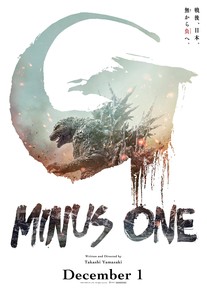Review
by Richard Eisenbeis,Godzilla Minus One
| Synopsis: |  |
||
In the final days of World War II, a small group of Japanese soldiers encounter a dinosaur-like creature on a remote island and are massacred—leaving only two survivors. Two years later, the creature, now many times its original size and capable of shooting thermonuclear breath, appears and begins attacking ships off the coast of Japan—moving ever closer to the still-devastated, post-war Japanese mainland. |
|||
| Review: | |||
At its most basic level, Godzilla Minus One is a thought experiment: What if Godzilla appeared and attacked Japan at its weakest point—i.e., in the years right after the Second World War? It's 1947, and Japan is suffering from a severe economic depression. The country is just starting to be rebuilt, with many still living in shacks built from the rubble of their firebombed homes. The military has been completely dissolved—with nearly all warships and planes confiscated, scrapped, or disarmed. With the appearance of Godzilla, the now Cold War-embroiled American government decides to leave the Japanese to fend off the monster themselves. With this, we get the central dilemma of the film: How do you defeat Godzilla under such limitations? Rather than focusing on how the Japanese bureaucracy at large deals with the problem (like in Hideaki Anno's Shin Godzilla), Godzilla Minus One grounds its story by making it the deeply personal tale of one man. Koichi is a former fighter pilot suffering from PTSD and survivor's guilt. He is a man whose inability to fire on the pre-nuclear Godzilla when he had the chance left a squad of soldiers massacred. After returning home, he finds his parents dead and his home a pile of rubble. He is left to struggle to survive in the years after the war—yet he manages to make a found family. Noriko, a young woman caring for an abandoned baby she found, unilaterally moves into his house. Meanwhile, he takes up the dangerous job of disarming the sea mines littering the coastline of Japan to care for them—becoming close friends with his coworkers in the process. Yet, just as he wonders if he can be forgiven for his cowardice in the war, Godzilla reappears—and each new death at the monster's hands weighs heavily on his conscience. Koichi's story is about a man whose war never ended—it continues every night in his dream even before Godzilla begins his rampage. But he is not the only one. All the characters in the film are suffering the aftereffects of the war. However, the fight against Godzilla gives them a chance not to die gloriously for their country but rather to fight to live on—to go boldly into the future with those they love. That said, while the core of the film is exceedingly strong—both in premise and emotional connection—it does dip a bit into cheesy melodrama at times. The film hits tear-jerking clichés overly hard to get an emotional reaction and ends up doing the opposite in the process. Luckily, these moments are almost entirely overshadowed by everything else the film offers. On the visual side of things, the film looks great more often than not. It is incredibly well-directed, with many creative shots that give the film character without making it hard to follow what is going on. Likewise, focusing on defeating Godzilla not on land but at sea sets the film apart from the myriad of other Godzilla films. The only real issue is the CG used for the titular monster—which can be hit-or-miss depending on the scene. And on the aural side of things, while the classic Godzilla theme is present, the original score shines through. It builds tension and keeps things exciting in the film's most important moments. Ultimately, Godzilla Minus One is a fantastic Godzilla film. Its premise is a great one, and watching the various characters come together to try to defeat Godzilla when their resources are so limited is incredibly engaging. At the same time, Koichi's personal struggle grounds the story in reality—making the film not just a battle against a giant monster but one to repair his war-torn soul. And while it's not a perfect film with its forays into melodrama and sub-par CG, these end up as minor complaints when all is said and done. If you're a fan of the original Godzilla or Shin Godzilla, you'll almost certainly love this one. It's a novel take on a classic franchise and one that's likely to be remembered among the best of them in the years to come. |
| Grade: | |||
|
Overall : A-
Story : A-
Music : B-
+ A fantastic premise (Godzilla attacking war-torn Japan) and a solid emotional core. |
|||
| discuss this in the forum (4 posts) | | |||
| Production Info: | ||
|
Full encyclopedia details about |
||